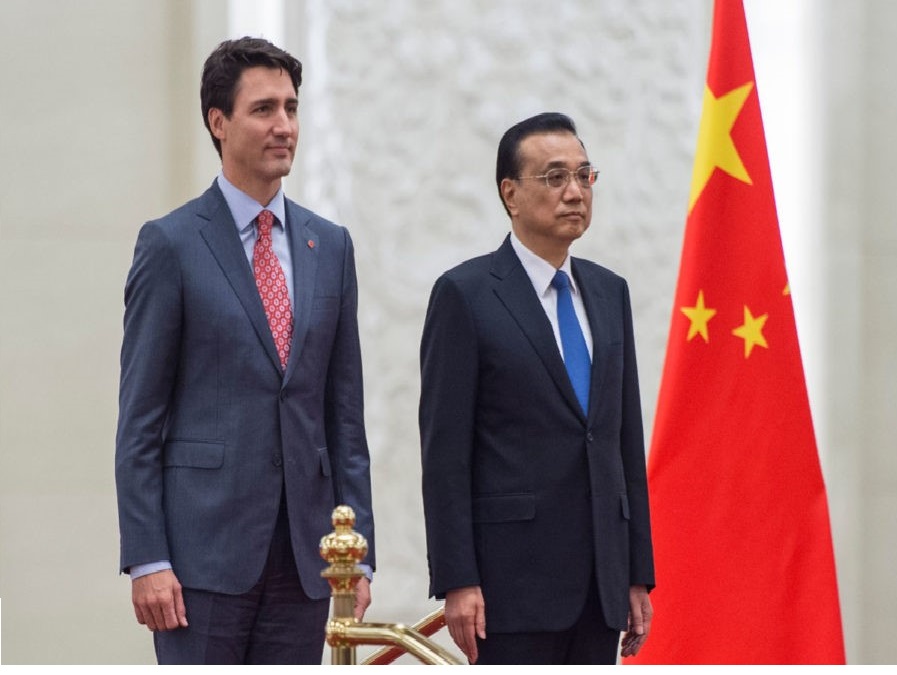World Uyghur Congress Sends Letter to Canadian PM Ahead of Visit
 Canada’s Prime Minister Justin Trudeau (L) and China’s Premier Li Keqiang listen to the national anthems during a welcome ceremony at the Great Hall of the People in Beijing on December 4, 2017.
Visiting Canadian Prime Minister Justin Trudeau and Chinese Premier Li Keqiang signed three trade agreements on December 4 as Ottawa tries to diversify commercial ties amid tough NAFTA negotiations with Washington. / AFP PHOTO / Fred DUFOUR
Canada’s Prime Minister Justin Trudeau (L) and China’s Premier Li Keqiang listen to the national anthems during a welcome ceremony at the Great Hall of the People in Beijing on December 4, 2017.
Visiting Canadian Prime Minister Justin Trudeau and Chinese Premier Li Keqiang signed three trade agreements on December 4 as Ottawa tries to diversify commercial ties amid tough NAFTA negotiations with Washington. / AFP PHOTO / Fred DUFOUR
World Uyghur Congress, 5 December 2017

The World Uyghur Congress sent a letter to the Canadian Prime Minister, Justin Trudeau, last week ahead of his anticipated visit to China to meet with Chinese President Xi Jinping. The Trudeau government has been relatively silent on human rights issues in the past, but has emphasised that its “quiet diplomacy” has been effective in terms of moving forward on these issues. A copy of the letter can be found below:
December 1, 2017 – Munich, Germany
Office of the Prime Minister
80 Wellington Street
Ottawa, ON K1A 0A2
Re: Human Rights Situation in East Turkestan (Xinjiang Uyghur Autonomous Region, China)
Dear Prime Minister Trudeau,
The human rights situation faced by the Uyghur people native to the East Turkistan has deteriorated dramatically in the past several years and is now reaching a critical point. Repressive security policies, use of re-education centres, vast restrictions on freedom of religion and policies aimed at undermining the Uyghur language have made life very difficult for the Uyghur people. As a strong proponent of human rights and fundamental freedoms, we are writing to urge you to raise this issue during your upcoming trip to China.
The Chinese authorities are instituting repressive policies and creating a pervasive police state in the XUAR which go beyond those in China proper. This year we have seen a massive increase in Chinese police and security personnel in XUAR, as well as increasingly sophisticated and invasive technology used to monitor and control the Uyghur people. The tools at their disposal include the latest technology, such as spyware which all residents are required to download onto their phones to allow the authorities to monitor them, the widespread collection of biometric data including DNA samples, and facial recognition cameras. Use of virtual private networks has been forbidden in an effort to cut Uyghurs off from communicating with the outside world.
Restrictions on religious practice have been severe for many years, but have become even stricter recently. Recently adopted law forbid the wearing of veils and beards and restricts the practice of Ramadan for pubic employees and students. Parents are forbidden from teaching their children about religion, and can be cut off from access to public services if they give their child a name from a list of illegal Muslim names. Recently the authorities confiscated illegal religious items from Uyghur households, including Qurans and pray rugs.
Another concerning development has been the intensified efforts to undermine the Uyghur language. Starting on Septmber 1st of this year, at the start of the fall semester, use of the Uyghur language was banned at all levels of education in the Hotan prefecture. Additionally, so-called ‘bi-lingual education’ schools heavily favor the use of Chinese and contribute further to the erosion of the Uyghur language. This is a deliberate policy aimed at accelerating Uyghur’s assimilation into Chinese culture, and goes against the protections for minority languages that exist in China’s own constitution.
Furthermore, this summer reports emerged of Uyghur students studying abroad being pressured to return home by threats to their families. This was experienced by students in countries around the world including in North America and Europe. In Egypt over a hundred students were detained and questioned by the Egyptian and Chinese authorities. Many of these students were forced to return home for political assessment; some were imprisoned or disappeared, while others were sent to the re-education centers that thousands of Uyghurs have been placed in during the past year. These centers amount to illegal arbitrary detention that is contrary to international human rights law.
It is impossible for Uyghurs to speak out against these abuses in China without severe punishment. Beijing University Professor Ilham Tohti, who offered mild criticism of China’s policies was sentenced to life in prison, a sentence that went far beyond what most dissidents receive.
Finally, we ask you to raise the case of Canadian citizen Huseyin Celil, a Uyghur human rights activist who was illegally deported to China from Uzbekistan and sentenced to life on spurious charges, without a fair trial or access to Canadian officials. Though his sentence was reduced, Mr. Celil should have never been imprisoned in the first place and should be released immediately.
With ever increasing repression in China and any dissent being met with force and violence, we rely on states who to speak up about human rights. It is the duty of the international community to respectfully call out those states that fail to live up to international human rights norms. We hope that you will seriously consider this letter and will raise these human rights concerns with the Chinese government. If the Chinese government is not held accountable, the situation will only get worse for the Uyghur people.
Thank you very much for your consideration,
Dolkun Isa
President
World Uyghur Congress

